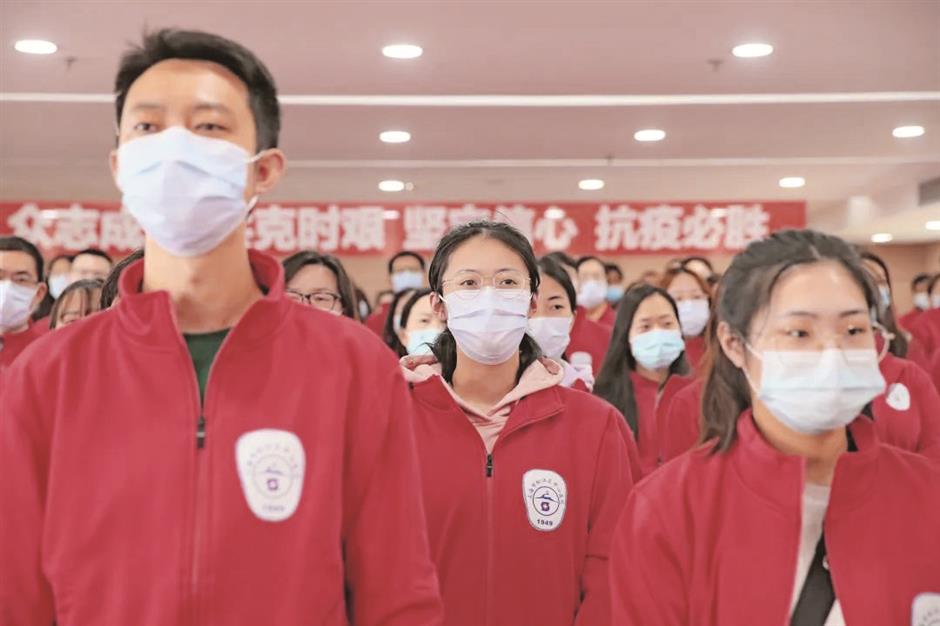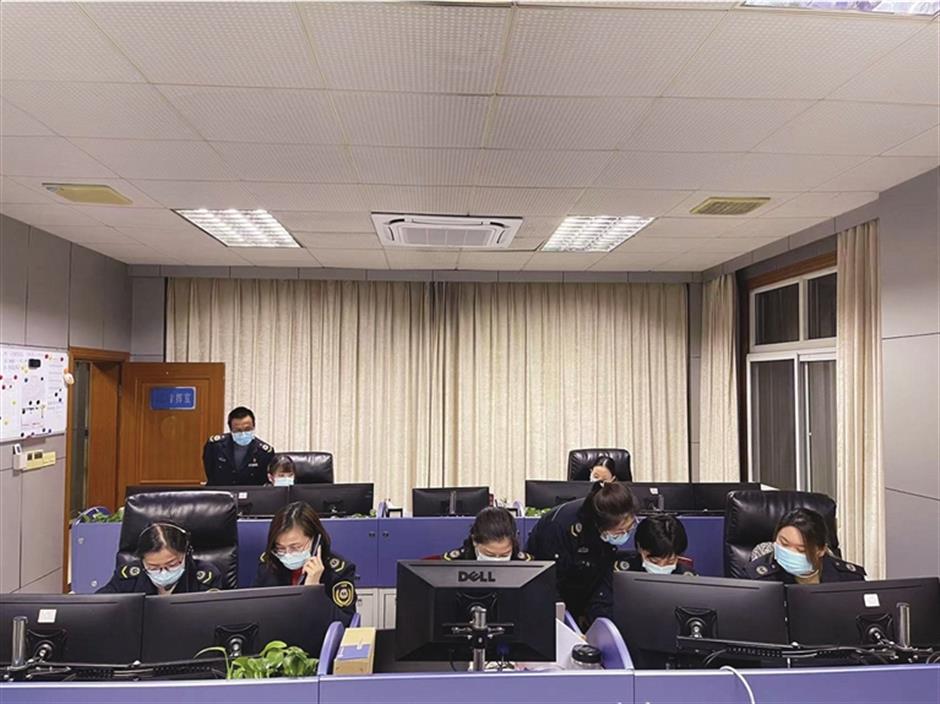Editor’s note:
Medical staff have been the warriors on the front line since the outbreak of the pandemic. Here, we have some stories about Songjiang’s medics working at nucleic acid testing sites, or the district’s emergency center, or who are about to be dispatched to various quarantine sites, or are responsible as drivers for patients going to quarantine.
Hospital medical staff at forefront of battle against epidemic
As well as ensuring the normal operations of the city’s hospitals, medical staff are fighting against the epidemic on the frontline.
Some go to communities to conduct nucleic acid testing, and some to quarantine sites for days.
Chen Lin is a nurse at Songjiang Center Hospital who rushed to the frontline when assigned tasks. She worked there more than ten hours. During that time, her ill husband also needed hospital care but she insisted on staying at her post.
“My husband supported me, and he said the frontline needed me more,” she said. “I was touched, and of course I love him very much.”
Guo Beifen is also a nurse at the hospital and her husband is a policeman. When she heard the hospital needed volunteers at the quarantine sites, Guo asked to go.
Ti Gong
Medical staff conduct nucleic acid testing.
“My husband already went to the quarantine site so I can not fall behind him in this fight against the epidemic,” Guo joked.
Fan Jiena is a chief nurse of the hospital. When assigned a task, she accepted without any hesitation even though it meant she has no time to care for her young daughter. She had to ask her neighbor for help.
“She is very good girl and she knows her parents are both medics, and their task is to protect the health of people,” Fan said.
Sun Jia jia is a nurse at the Fangta Hospital of Traditional Chinese Medicine who was at home ill. But knowing her hospital was short of medics, she asked to return to work.
The chief nurse was worried but Sun said: “Don’t worry, I am almost recovered. I can work in the daytime and get an infusion after work.”
Zhou Renming is the director of Respiratory Medicine at Sijing Hospital. Although he is 58 years old, Zhou still came to fore at the moment of crisis.
“Though my physical strength is not as good as that of youngsters, one more medic means one more physical strength,” Zhou said. “It is our responsibility to protect the health of the people.”
Yan Shuting is a nurse at Songjiang Maternity and Child Health Hospital. She actively joined the nucleic acid testing team of the hospital. The average age of the team is under 25.
“As a young nurse, I should step forward bravely,” Yan said. “There are a lot of more experienced medics in the team and they have overcome many difficulties to persist in the work.”
Songjiang medics go into a ‘battle without bullets’
A medical team comprising 141 doctors and nurses and 31 support staff gathered at the Songjiang Central Hospital to build morale ahead of being dispatched to various central quarantine sites in the district on March 31.
Members of the team came from the central hospital’s cardiology, respiratory, gastroenterology, radiology, pediatrics and pharmacy departments.
“In this battle without bullets, we’re now asking for a battle assignment,” said Xu Xun, a doctor from the respiratory department of Songjiang Central Hospital.
“We will be soldiers in harm’s way and we’ll be victors. We’ll use our medical skills and knowledge to win this battle.”
Among the 141 medical workers are 106 nurses.
“We’ll make every effort and show our empathy in every aspect,” said Zhang Jianfeng, a head nurse.
In addition to boosting the morale, Gao Zhen, chief of the hospital, also reminded the medical workers of ensuring their own elf-protection.

Ti Gong
A medical team gathered at the Songjiang Central Hospital to build morale ahead of being dispatched to various central quarantine sites in the district on March 31.
Songjiang medical staff embrace huge responsibility
All staff at the Songjiang medical emergency center are standing firm, with it entering emergency status due to the COVID-19 resurgence.
Shen Tiejun is responsible for the disinfection of ambulances at the Chendun site of the medical emergency center.
The Chendun site has 12 ambulances, and after each run Shen and his team disinfect all vehicles.
Shen is a veteran in the fight against the epidemic. Each time Shen comes to the disinfection site, he will persist in the position for more than one month.
“We have huge responsibility on our shoulders as it is important to disinfect the vehicles and cut off the transmission of virus,” Shen said.
“An ambulance is a closed environment, and every part of the compartment must be disinfected. If you just use disinfectant to wipe every corner, it will be inefficient and will leave areas. The automatic hydrogen peroxide disinfection machine will improve efficiency and is safer.
Shen and his team-mates have explored one efficient method to disinfect the ambulance, known as the human-machine complementary operation process.
“First, use the machine for disinfection, that is, two sprays, each sealed for half an hour, then manually wipe for the second disinfection, and then use the ultraviolet for the third disinfection,” Shen said. “The complete process takes one-and-a-half hours.
Peng Chengyuan is an ambulance driver at the medical emergency center. At 2am one day, he received an emergency task. Peng rushed to the center immediately. During work, Peng only ate and drank small amounts to avoid going to the toilet so he would be immediately available for a call-out. Peng’s wife is a nurse, busy with nucleic acid testing. As a result, Peng has had to send his son to his home village to be cared for.
For staff at the medical emergency center, despite constant phone calls and fatigue, everyone steps forward.

Ti Gong
Workers at Songjiang medical emergency center stand firm to battle against the COVID-19 resurgence.
Retired soldier steps forward to serve as driver
Wearing heavy protective clothing and driving a car, Yang Chenfeng sets off once again.
As a full-time driver of a transport car of the Epidemic Prevention and Control Office at Yongfeng Street, Yang has gone through two extraordinary winters since the outbreak of the epidemic in 2020.
Being ready to go anytime, anywhere, and quickly take people to quarantine sites, is his and his colleagues’ task.
“As a retired soldier, we should step forward, we don’t need any reason,” Yang said.
Since July 2020, Yang has undertaken the transfer of people. He works continuously for a month, and then is quarantined for 14 days. He must be ready to adjust his schedule, according to the epidemic situation.
“At the busiest time, I had to transport more than 20 people a day,” Yang said. “The farthest trip took about three hours to go back and forth. There is no need for too much explanation, the citizens are very cooperative.
“There is no daytime or night time for transfer work. It is often an order, and we will set off immediately. Sometimes we can only use fragmented time to rest. It is common to have dinner and breakfast combined.”
Wang Yan, a staff member of the office, added: “On one transfer mission, Yang Chenfeng set off at 11pm and completed the transfer at 4am the next day. When he returned to the isolation hotel, before taking off his protective suit, he received an urgent task. Yang set off immediately.”
Yang commented: “I just did what I could, it’s nothing important”.
In the process of transportation, it is inevitable to encounter various emergencies. A tire is punctured, the mobile phone is out of power, or there is no drinking water. These are not rare things but Yang always has a sincere heart to serve everyone.
When transferring special groups such as children and the elderly, Yang sets off earlier than usual to give them enough time to pack their luggage. When transferring people from ethnic minorities, he will inform the quarantine hotel about their eating habits.
“I never feel tired as driving the car is serving the people,” said Yang.
[ad_2]
Originally Appeared Here